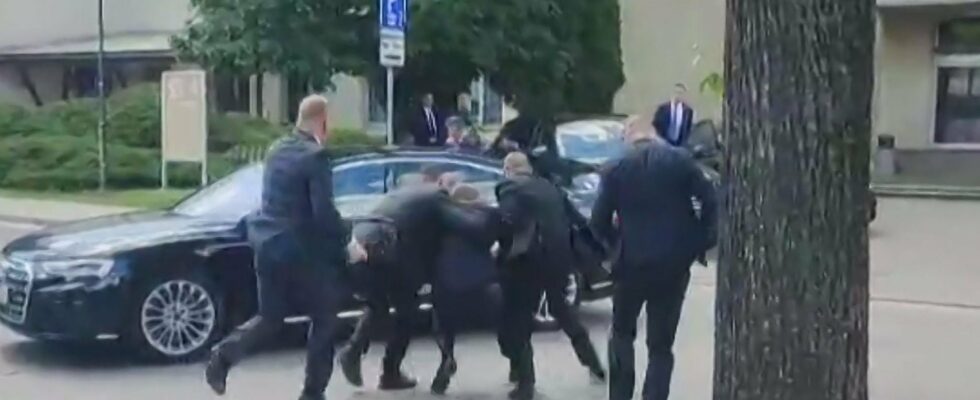“The world is full of violence and guns. People seem to be going crazy.” This is what Juraj Chintula declared in the past in a video. Eight years after it was posted online, this 71-year-old Slovak writer seems to have fallen into the madness he denounced: he is suspected of having shot Robert Fico.
The Slovak Prime Minister is in a stable but still “very serious” condition this Thursday morning, after being shot the day before, said Deputy Prime Minister Robert Kalinak, also Defense Minister. Robert Fico was shot “several times”, according to his official Facebook page, early Wednesday afternoon after a cabinet meeting in Handlova, central Slovakia.
“Tonight, doctors managed to stabilize the patient’s condition,” said Robert Kalinak, who is also Defense Minister. “Unfortunately, the condition remains very serious, because his injuries are complicated,” he added during a press briefing in front of the Roosevelt hospital in Banska Bystrica, a town in the center of the country. Robert Fico, 59, underwent “a five-hour operation” on Wednesday, the director of the establishment Miriam Lapunikova said this Thursday morning, confirming that he is still in a “really very serious” condition and will remain in care. intensive as he suffers from “multiple injuries”.
An author of poetry collections
Police arrested the suspected assailant, a 71-year-old man identified by Slovak media, including the APA news agency, as Juraj Chintula, a 71-year-old Slovak writer. “I think I can confirm it, yes,” Interior Minister Matus Sutaj Estok replied to journalists who questioned him about the identity of the shooter.
According to media reports, Juraj Chintula is one of the founders of the Duha (Rainbow) literary club in the town of Levice. The press adds that he is the author of several collections of poetry and that he is a member of the official association of Slovak writers. The association confirmed on Facebook that he had been a member since 2015, and that if the facts were confirmed “the membership of this despicable person would be immediately canceled”.
The suspect’s son, for his part, told the news site aktuality that his father had a legally registered firearm. Asked about his father’s feelings about Robert Fico, he replied: “I’ll tell you one thing: He didn’t vote for him. That’s all I can say.”
“Let’s be dissatisfied, but not violent!”
No information has been given at this stage on his motivations. But, as spotted Le Figaro And Radio Francein a video shared on social networks and cited by Pravda, the writer, filmed seated and injured in the head, states in what looks like a first interrogation: “I do not agree with the government’s policy.” “The media are liquidated. Why is Slovak radio and television under attack? Why is judge Jan Mazak (editor’s note: former president of the judicial council) fired?”
With the reform of television and the ousting of a judge, Juraj Chintula refers to two cases on the front page of the news in Slovakia. A highly contested bill wants to place public broadcasting under the supervision of political power in order to make it an organ of propaganda. Also in the pipeline of the Slovak government is the reform which softens penalties for corruption and abolishes the special prosecutor’s office which works on these subjects.
Juraj Chintula, who reportedly worked in the past as a security guard, regularly wrote rather left-leaning political columns on his blog. In 2016, he was violently attacked by a young man who had taken drugs, attracting media attention, indicates the Slovak channel Markíza TV.
The same year, he founded his political movement “Hnutie proti nasiliu” in Levice, which means “Movement against violence” in Slovak. It defines itself on its Facebook page as “an emerging political party whose objective is to prevent the spread of violence in society”. “Violence is often a reaction of people, a form of expression of simple dissatisfaction with the situation. Let us be dissatisfied, but not violent!”, he wrote at the time.
